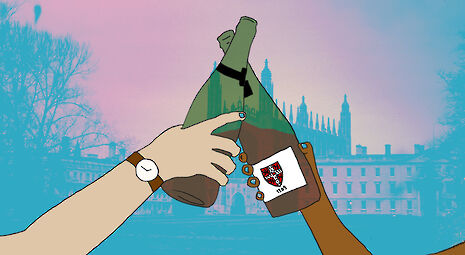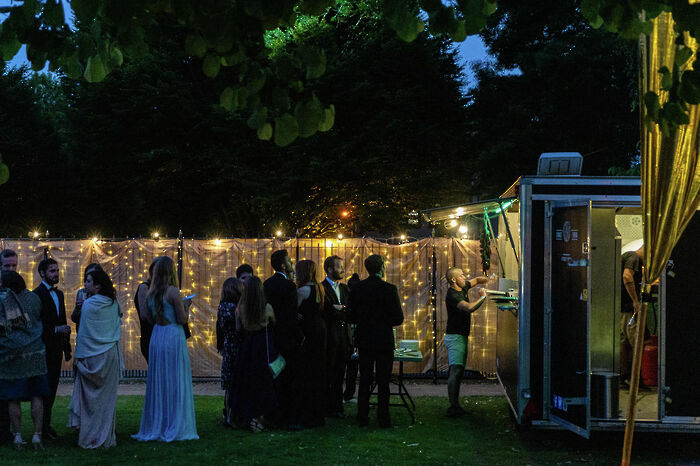We need to do more to accommodate non-drinkers at Cambridge events
Jack Chellman argues that normalised drinking in Cambridge shouldn’t be allowed to exclude non-drinkers

Alcohol orientates much of our social lives at Cambridge. Though the University’s drinking culture seems to compare favorably with that of other UK institutions, the pressure to drink alcohol persists, creating social situations that unnecessarily isolate Cambridge’s significant number of non-drinking students. Even small shifts in our approach to alcohol and sobriety can create a substantial difference in the degree to which non-drinkers feel welcome and respected at Cambridge.
A 2018 study from University College London found an increase in non-drinkers aged 16-24 between 2005 and 2015. It also found a corresponding decrease in the number of young people drinking excessively. Students are thinking more carefully about their alcohol intake, and university culture is beginning to reflect this reality.
But these changes don’t erase the lingering risks of the UK’s drinking customs. A 2018 National Union of Students study found that over three-quarters of students feel pressured to get drunk or identify drunkenness with normal university behavior. Freshers have a particular difficulty navigating this “binge-drinking culture in the UK,” often viewing drunkenness as a “rite of passage.” Often, international students come to the UK to find the culture of excessive drinking alienating.
Cambridge is not immune to these dangers. A 2017 study suggested that while a third of students don’t drink, another third drink more than “the recommended weekly limit.” This latter constituency reflects reports of Cambridge’s own “binge-drinking culture,” in which avoiding alcohol “feels like trying to walk in the opposite direction to everybody else.” Again and again, students describe excessive drinking as the standard by which social reputations are judged. Drinking societies solidify these norms, as do alcoholic expectations during Freshers’ Week.
We must commit to normalising responsible approaches to alcohol, and the growing number of non-drinkers across the UK demands that we also do more to accommodate sobriety. Beneath the expectation to overindulge lies a troubling expectation to indulge at all.
We should change the way we speak to non-drinkers. When someone says they’re not drinking, don’t ask them why
Combatting that expectation begins with the simple logistics of our social events. Last year, a writer for Varsity noted that much of the marketing for activities in Cambridge set alcohol as an organising principle. This year is no different. Colleges organise “Dean’s Drinks,” subject drinks, or drinks receptions. Departments invite students to “Supervisor Drinks” and drinks to follow seminars or workshops. Whether or not these events offer non-alcoholic options, their titles and descriptions leave non-drinking students wondering whether they should attend.
Non-alcoholic options matter too. Another writer last year noted that her matriculation dinner offered only water as an alternative to wine. This year, I’ve found that events offer a few glasses of orange juice when they offer anything non-alcoholic at all. I don’t consider water and orange juice particularly festive beverages, and I’d venture a guess that most non-drinkers agree. Something sparkling or caffeinated could be available - or even just a plate of snacks. Small changes like these can make non-drinking students feel more welcome at events.
Furthermore, alcohol shouldn’t impose an unfair economic burden on non-drinkers. Some events already offer non-drinking tickets. Making these available whenever possible, and ensuring non-drinkers aren’t expected to pay for alcohol in more casual settings (like when splitting a bill) is necessary to make non-drinkers feel welcome.
Accommodating sobriety can be even simpler than these logistial shifts. We should change the way we speak to non-drinkers. When someone says they’re not drinking, don’t ask them why. At best, you’re identifying them as irregular––an oddity in need of interrogation. At worst, you’re probing a decision associated with personal pain. There are many mundane reasons to stop drinking. But there’s also alcoholism and family trauma, personal fears and mental health.
Other reactions are equally obnoxious. When someone says they don’t drink, don’t tell them how impressed or shocked you are, as it adds to that feeling of irregularity and runs the risk of sounding patronising. We should also avoid telling them that we could never stop drinking, as that only perpetuates the misconception that sober people judge those who drink. And we should certainly avoid asking non-drinkers if they’re sure they don’t want anything. As with all personal decisions, it’s our responsibility to respect a person’s choices.
Non-drinkers make up a significant portion of the students attending Cambridge socials. We should design events to reflect this reality, making sure that alcohol doesn’t offer the only option for “normal” engagement in student life. Non-drinkers should be treated normally when they do engage, and we should direct our conversations away from their personal decisions. Accommodating sobriety plays an important part in diminishing Cambridge’s troubling drinking culture.
 News / Hundreds of Cambridge academics demand vote on fate of vet course20 February 2026
News / Hundreds of Cambridge academics demand vote on fate of vet course20 February 2026 News / Judge Business School advisor resigns over Epstein and Andrew links18 February 2026
News / Judge Business School advisor resigns over Epstein and Andrew links18 February 2026 News / University Council rescinds University Centre membership20 February 2026
News / University Council rescinds University Centre membership20 February 2026 News / Petition demands University reverse decision on vegan menu20 February 2026
News / Petition demands University reverse decision on vegan menu20 February 2026 News / Caius students fail to pass Pride flag proposal20 February 2026
News / Caius students fail to pass Pride flag proposal20 February 2026









